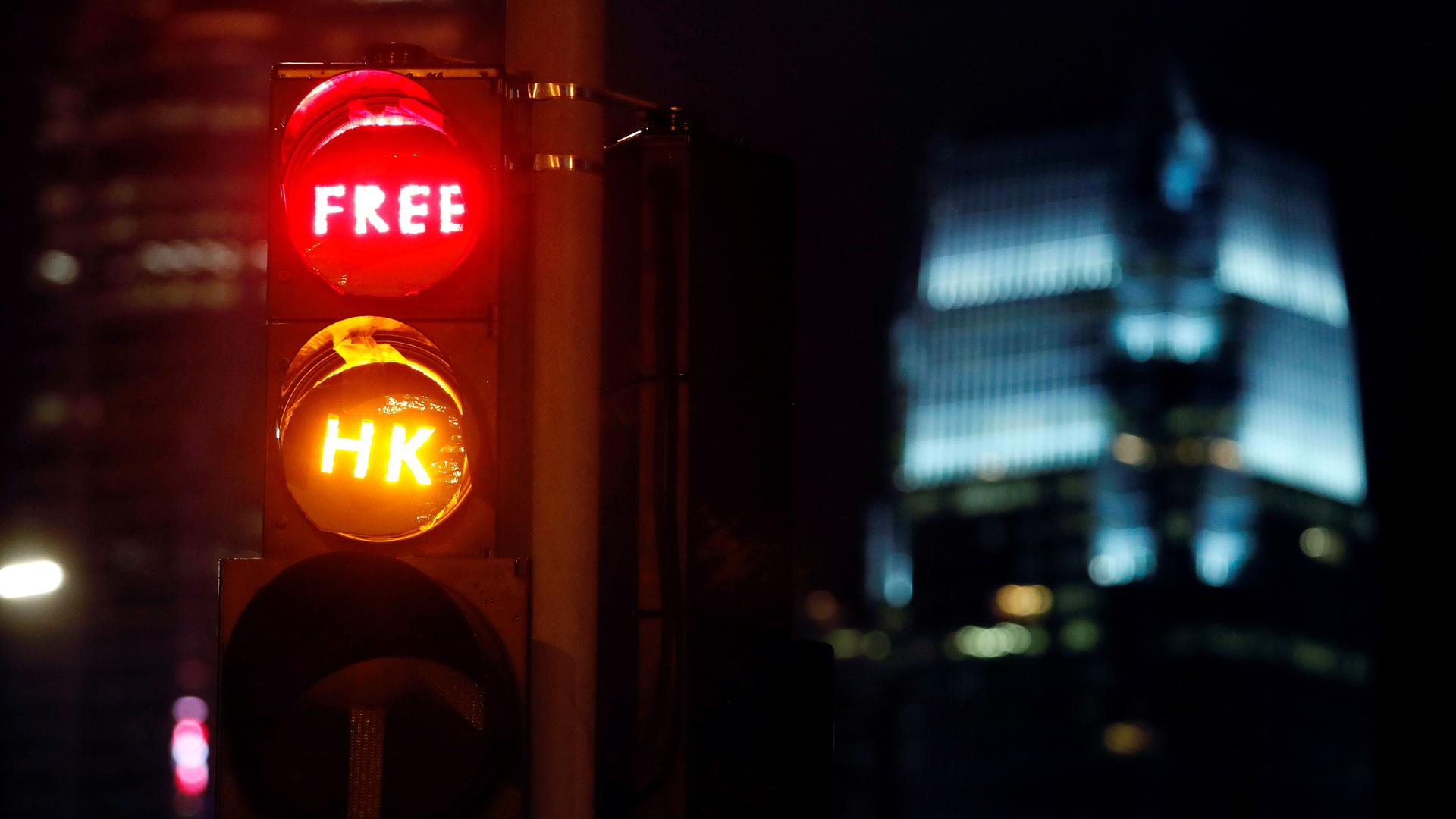It’s hard to watch Hong Kong’s unrest — a self-described “revolution” inside the largest authoritarian nation on earth — and not wonder: How much more dissent will Beijing tolerate?
It began as a backlash to a single extradition bill, since scrapped, that would have left Hong Kong vulnerable to mainland China’s justice system.
It has since metastasized into something more fierce: a mass expression of rage, leveled at China’s Communist Party, their disciples in Hong Kong’s local government and the police, deployed each night to suppress dissent.
There is a surreal new normal in Hong Kong. The city is still one of Asia’s most cosmopolitan — and, by and large, a safe place for visitors. But it is also sprayed up with insurrectionist graffiti: “Free Hong Kong!” or “CHI-NAZI.”
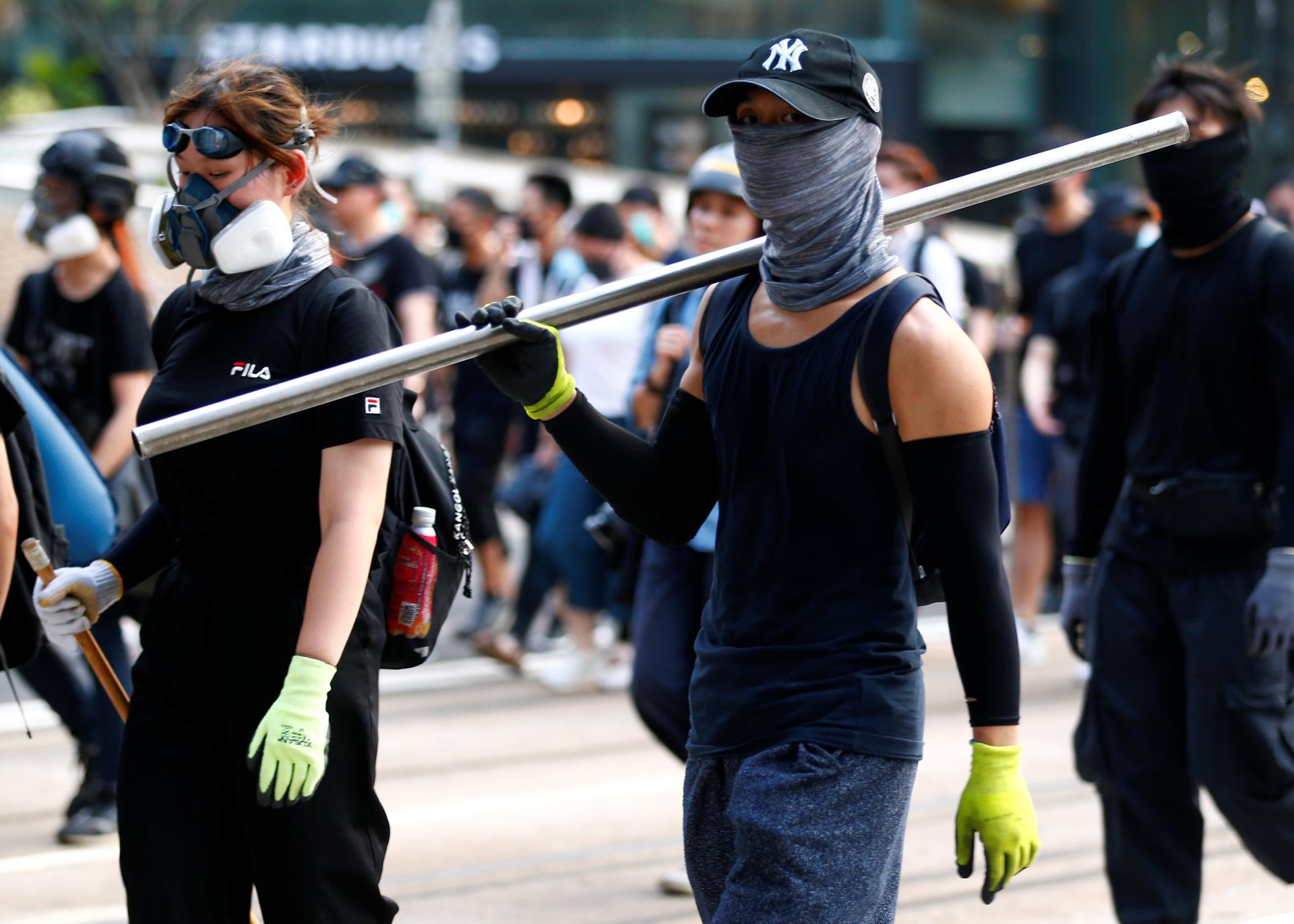
Go there on any given weekend, track down the roving protests, and you’ll find a sea of Hongkongers, all clad in black. They’re strangers to one another, faces obscured by gas masks, yet they move in synchronicity, coordinating movements through encrypted apps.
They try to seize parts of the city. Major avenues. Subway stations. Even Hong Kong’s airport, among the busiest in the world.
By the time riot police are ready to storm in, firing volleys of tear gas canisters, the protesters have already built crude ramparts to keep them out. These barricades are heaping piles of metal, made from stuff ripped from the ground: street signs, guardrails, trash bins. Any public property is considered fair game.
Once police squadrons finally break through, the protesters will try to slip away, evaporating into the night. (Their motto is “be like water.”) Then they’ll resurface in another part of the city. Those captured by cops are often bashed with clubs. More than 1,000 have been jailed.
Related: Hong Kong arrests won’t ‘cut off the heads of these protests,’ lawyer says
“We’re holding the scrotum of the government. Making it painful!”
Are the bloody welts and scorched sinuses worth it? In the words of one masked protester, who was joining a human barricade at Hong Kong’s airport and asked his name not be used for fear of legal repercussions, this is how a million Davids must fight a Goliath: “We’re holding the scrotum of the government. Making it painful!”
That’s their strategy. Squeeze Hong Kong’s sensitive parts until the economy screams. Eventually, they hope, the city’s business-minded leadership will buckle.
Related: Hong Kong leader says she would quit if she could
Hong Kong’s government is run by an executive branch, one dominated by a pro-Beijing elite. They are the guardians of “one country, two systems,” a model allowing Hongkongers to do things that are forbidden in mainland China — such as mock President Xi Jinping. Or freely log onto Twitter or Facebook.
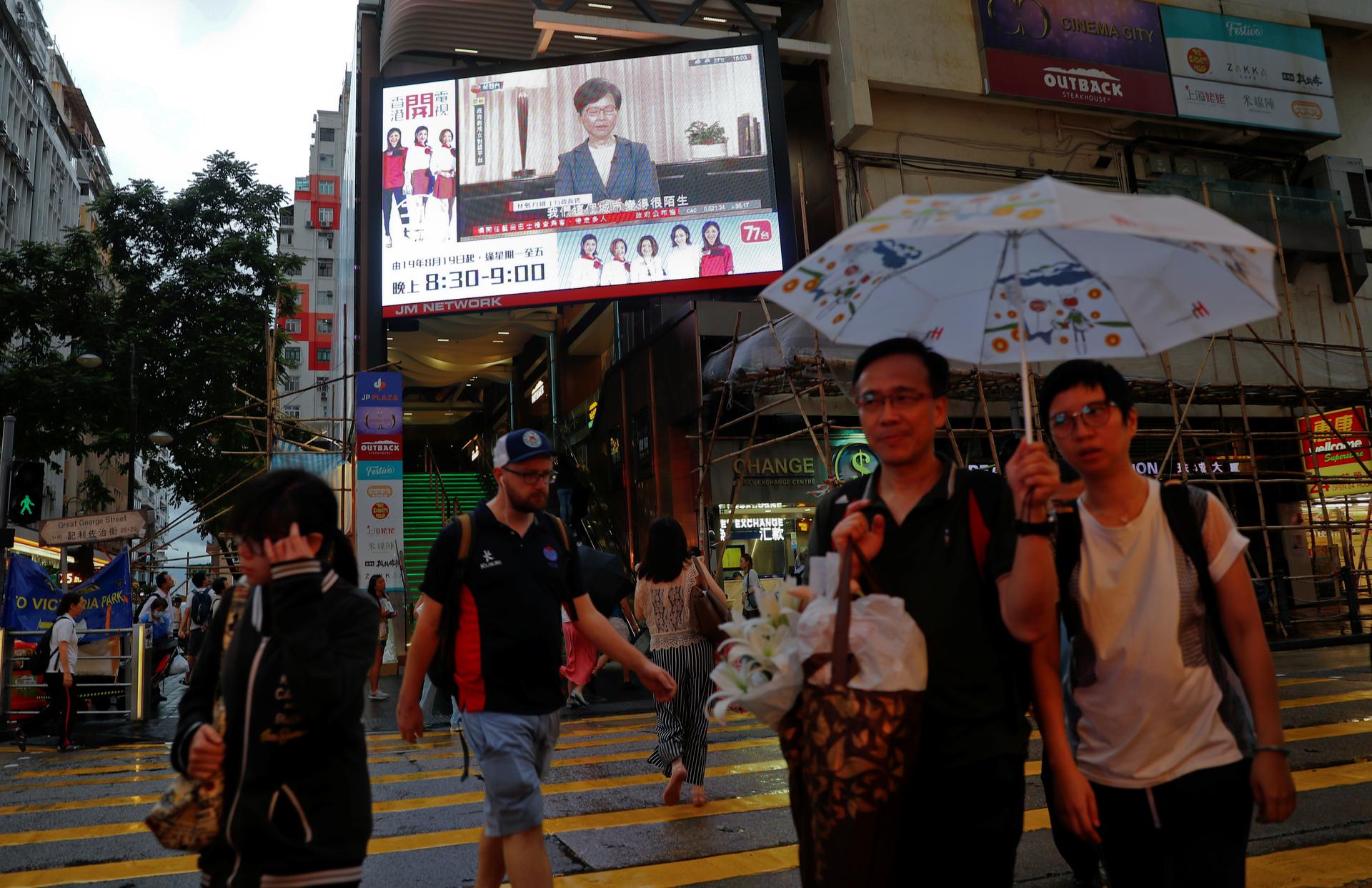
Beijing has never adored this setup. It was hammered out with the British government which, in 1997, handed the island colony back to China after ruling it since the mid-1800s.
Under that agreement, the legal barriers dividing Hong Kong from China will officially melt away in 2047. But in the view of protesters, the Communist Party is keen to slash away these unique freedoms well ahead of schedule.
Their prime fear is that, as a popular refrain goes, Hong Kong will become “just like any other city in China.” And if mainland Chinese forces end up clomping though Hong Kong’s streets, crushing dissent with deadly force — a scenario Beijing has invoked more than once — the city’s independent streak will be rubbed out forever.
Related: Hong Kong protesters challenge surveillance with apps and umbrellas
Freedom has its limitations
To Innes Tang, a rising political voice among Hong Kong’s pro-China political establishment, the protesters aren’t just “traitors.”
They’re out-of-touch traitors.
“They think, ‘Oh, China is poor.’ But it’s not true. My country is going big and going strong and going powerful!”
“They still have an impression of China from the 1970s and ’80s,” Tang says. “They think, ‘Oh, China is poor.’ But it’s not true. My country is going big and going strong and going powerful!”
Tang is 55, born and raised in Hong Kong. His day job as a produce importer requires frequent travel to the mainland. With each trip, he comes back more in awe of Chinese advancement.
“I used to tell people, ‘I’m just a Hongkonger.’ But the past five years have changed me,” Tang says. “Now, I’d tell you, ‘I am Chinese.’”
And so what, he says, if Hong Kong becomes “just another city” in China? Have these protesters not seen a modern Chinese metropolis? The gleaming steel towers? The deluxe trains? The semi-cashless society where people shop by scanning apps on their Huawei smartphones?
Related: The memes of the Hong Kong protests
“The day is coming when life in China will be better than life in Hong Kong. That’s when we, the people of Hong Kong, will look over and ask to live under their rules. One country, one system.”
“The day is coming,” he says, “when life in China will be better than life in Hong Kong. That’s when we, the people of Hong Kong, will look over and ask to live under their rules. One country, one system.”
To counter the protesters’ fervor, Tang has been organizing pro-China rallies through a political organization called Politihk Social Strategic. Though Tang’s rallies are smaller — they might attract a few hundred thousand, while an anti-establishment protest can bring in more than a million — they are nevertheless impassioned.
China’s crimson flag will stream overhead. Local dignitaries take the stage, singing glorious anthems, karaoke-style. Attendees might run into firebrand local politicians, such as Junius Ho, infamous for once saying that anyone advocating Hong Kong independence should be “killed without mercy.”
What the media calls “protests,” Tang says, are now “definitely riots. A peaceful protester should not be throwing stones or gasoline bombs. “We all enjoy freedom of speech. But speech has its limitations,” he says.
Such as?
“Look at social media,” Tang says. He says Beijing is right to block Facebook and Twitter because, well, just look at how they powered the Arab Spring. In Hong Kong, where the internet is mostly uncensored, he sees malcontents coordinating revolution on their iPhones.
Related: Hong Kong families form peaceful ‘human chain’ ahead of airport protest
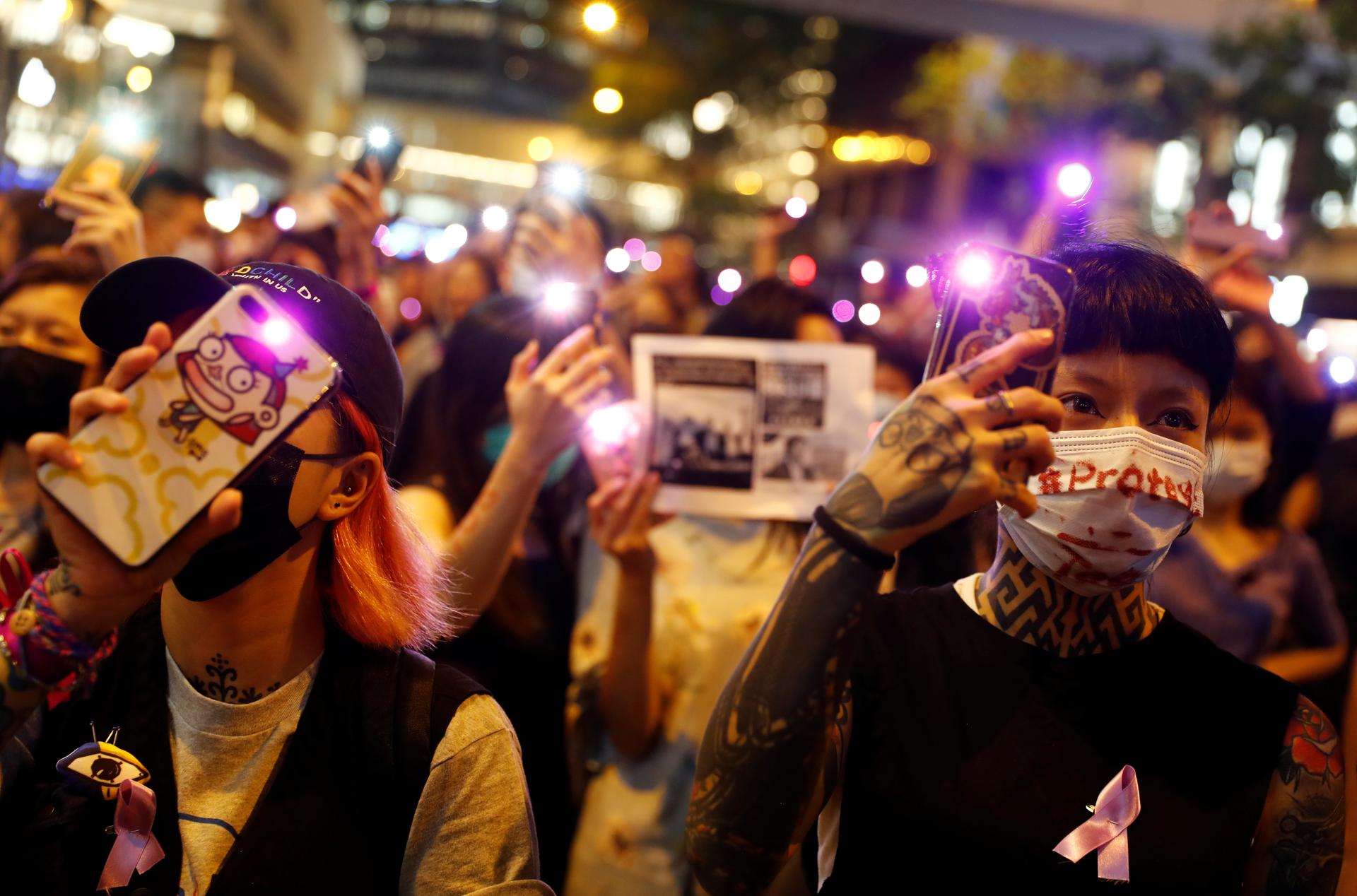
“Limiting social media? I think that’s fair,” Tang says. “In every country, security should always come first.”
This is the crux of Hong Kong’s division. Where Chinese patriots see sensible controls to promote order and harmony, the protesters gasp in horror at shackles on their rights.
As for independence, very few protesters explicitly call for Hong Kong to split from China. But chants of “Liberate Hong Kong! The revolution of our time!” have indeed grown common.
To protesters, that could mean something like “Hands off my rights, Beijing.” But the pro-China patriots may instead hear a cry for separatism. Or in the words of Chinese officials, the “first signs of terrorism.”
“An independent Hong Kong?” Tang says. “In the past, that was a joke. Now it’s a threat.”
China’s Communist Party agrees. In state media, protests are linked to murky foreign plots, nudged along by the CIA, that ultimately aim to wrench Hong Kong away from Chinese control.
And when a wing of the movement gathers to wave American flags, belt out the Star-Spangled Banner and plead for President Donald Trump’s help in “liberating” Hong Kong, state media asks if the world really needs “more evidence to prove outside forces are behind the separatist demonstrations?”
The core message, delivered through state mouthpieces, is hardly subtle: “clear secessionism in any form will be crushed.”
Or more ominously, the “end is coming for those attempting to disrupt Hong Kong.”
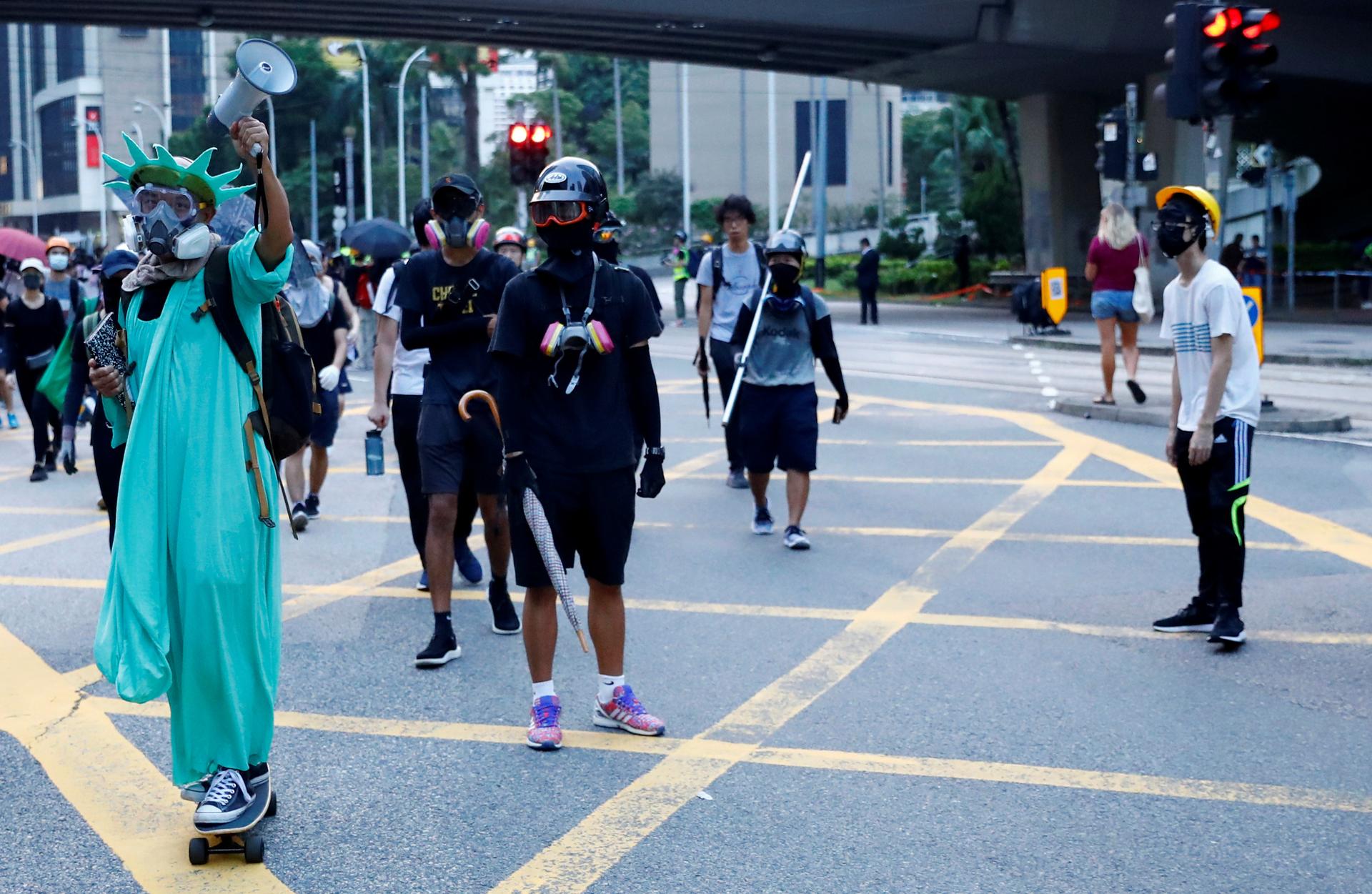
Not a pretty sight
Anyone wondering how Beijing would smash Hong Kong’s so-called “radicals” need not use their imagination. A series of videos, produced by various armed wings of the People’s Republic of China, provide a glimpse.
Just watch the People’s Armed Police of China as they run through riot control drills right on the Hong Kong border.
Or the People’s Liberation Army (PLA) — namely the troops stationed year-round in Hong Kong — toppling hordes of mock protesters. Both clips, broadcast on social media, are set to action-movie soundtracks.
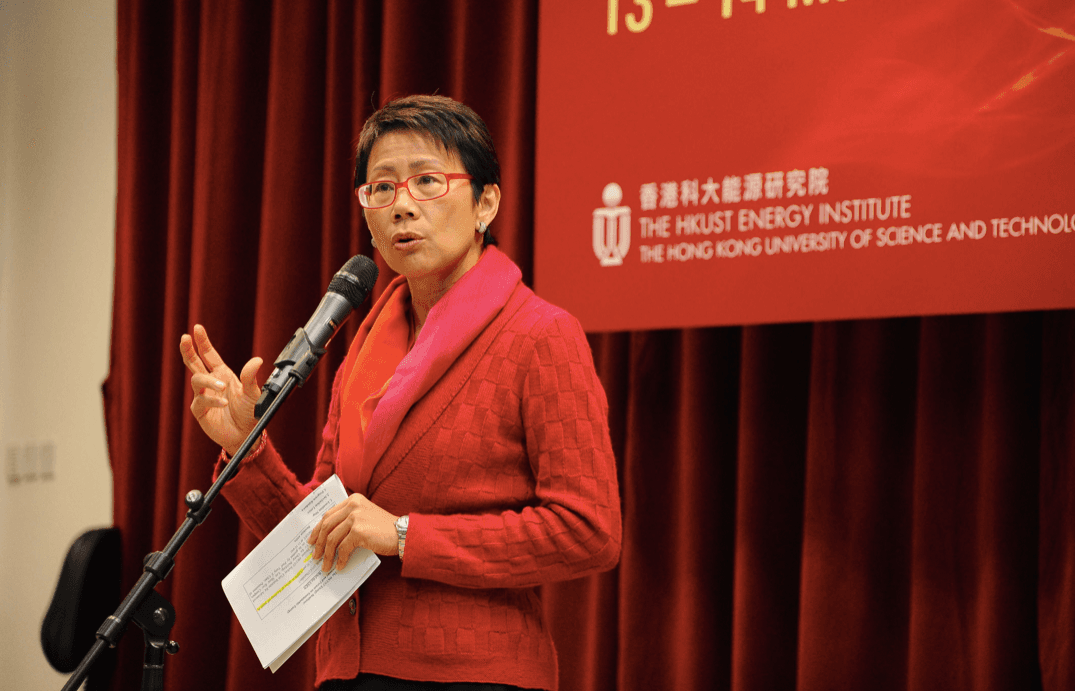
When it comes to Hong Kong, Beijing has a bright red line, according to Christine Loh. Currently an academic, she was a policymaker under Hong Kong’s previous leader, Leung Chun-ying. She also authored “Underground Front,” a book detailing Communist Party operations in Hong Kong.
These new videos are a “warning,” Loh says, that caution, “‘Don’t go too far. We can come in. And it’s not a pretty sight. It’s the use of force.’ But that doesn’t mean they’re about to march over.”
“The red line, the political red line,” she says, “is, ‘Do not call for independence.’ Don’t call for anything that comes close to talking about independence.”
Stay far away from that line, she says, and Hong Kong can “have a very high degree of autonomy on a day-to-day basis. But now we’re edging around that abyss.”
Would mainland Chinese forces actually mow down protesters? That scenario does lurk in the minds of some Hongkongers, many of whom belong to families that fled Mao Zedong-era violence: the Cultural Revolution and, before that, the communist purge of US-backed nationalists in the 1940s and 1950s.
Related: Hong Kong pop star fights for ‘our autonomy’ as protests against Beijing continue
But that nightmare scenario is still remote — at least according to Loh. (Others aren’t so sure.) The trouble with navigating that red line is that neither side seems to agree where it begins.
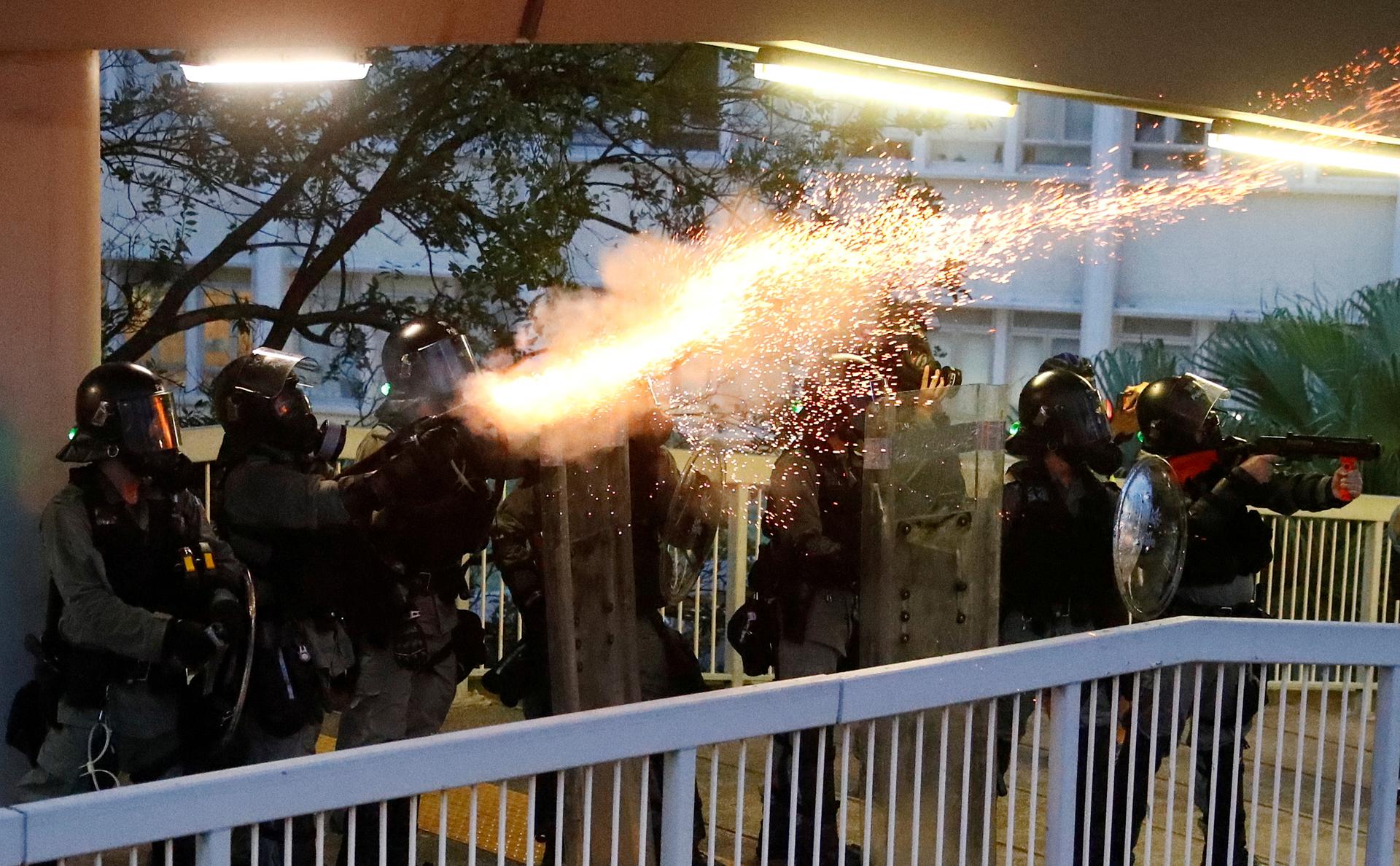
When Beijing officials insist on vetting potential politicians in Hong Kong, ensuring none of them harbor even a smidgen of separatist ideology, Loh says they see that offer as “an advanced political experiment … an amazing thing, from their perspective.”
After all, just 15 miles away in mainland China, citizens have no hope of choosing their leaders in open elections. Is a little vetting to intolerable? Shouldn’t Hongkongers be grateful?
No, according to millions of Hongkongers. Beijing’s push for more political vetting kicked off the Umbrella Movement, the less-raucous predecessor to the current struggle.
Related: Hong Kong students rally peacefully before brief night skirmishes
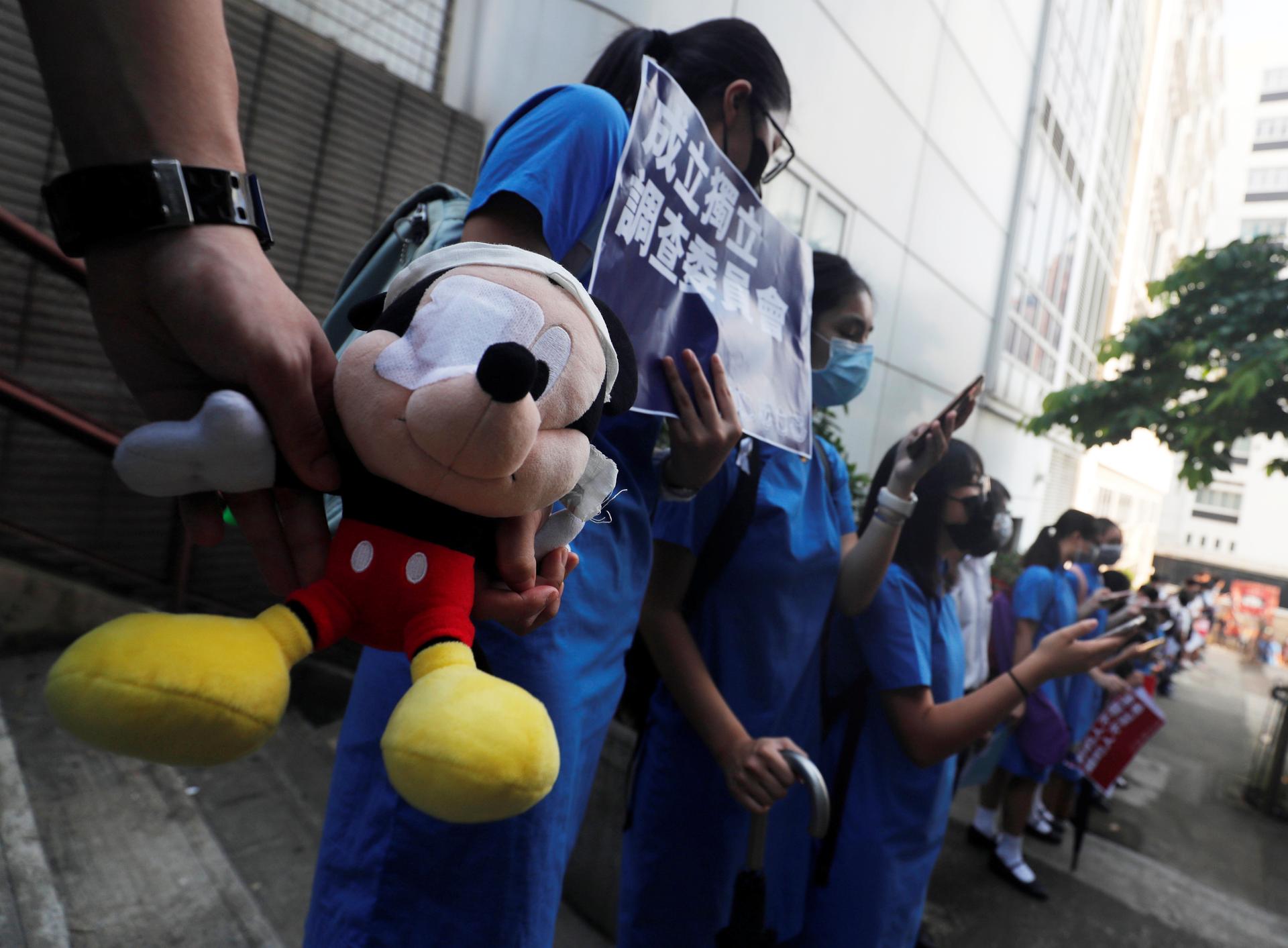
Hongkongers (plus many politicians in Washington, DC) view their struggle as valiant. But in Beijing, it’s seen as a bratty tantrum. Many Communist Party officials see Hong Kong as ideologically tainted — full of people who’ve inherited bitterness and foreign ideas.
Take it from Gen. Xu Yan, a lecturer at the PLA’s top war college, who said in a speech last year that:
“The foundation of Hong Kong society … is the worst in China. Even worse than Taiwan.” A full third of all Hongkongers, he said, are descendants of class enemies who were “purged, stricken, driven out and deprived of everything by the Communist Party. Many of these people hate us with every fiber of their beings … How can you expect people like this to have good thoughts about you?”
And yet, despite all that, Beijing genuinely does not want to vaporize Hong Kong’s special freedoms overnight, Loh says.
Nor do they want to micromanage every move that Hong Kong’s executive branch makes. In her most recent government position, overseeing the environment, she says that “no one told me what to do.”
Nor does the politburo relish the idea, she says, of smashing the protesters with deadly force. In fact, she can imagine a scenario in which Hong Kong is punished not with bloodshed, but with neglect.
“You also don’t want to reach a stage,” she says, “where they think, ‘Oh, this is a huge annoyance … so we’ll just leave Hong Kong alone.’ If the new default is, every weekend, you’re going to perpetuate violence and inconvenience, China can say, “Look, our army is there, as long as you don’t do anything (too radical), you can have that default. That’s just going to be really bad for you.”
“Then they can say, ‘Those benefits you have in Hong Kong? As China continues to develop, we can give similar benefits to other parts of China’” — all while freezing out Hong Kong, she says, from the mainland’s prosperity.
Trading freedom for prosperity may actually appeal to the more zealous wing of protesters. A grim slogan has gained currency with the movement: “If we burn, you burn with us.” It implies that Hong Kong is still a vital powerhouse — and that protesters, in threatening to wound its economy, still hold leverage over Beijing.
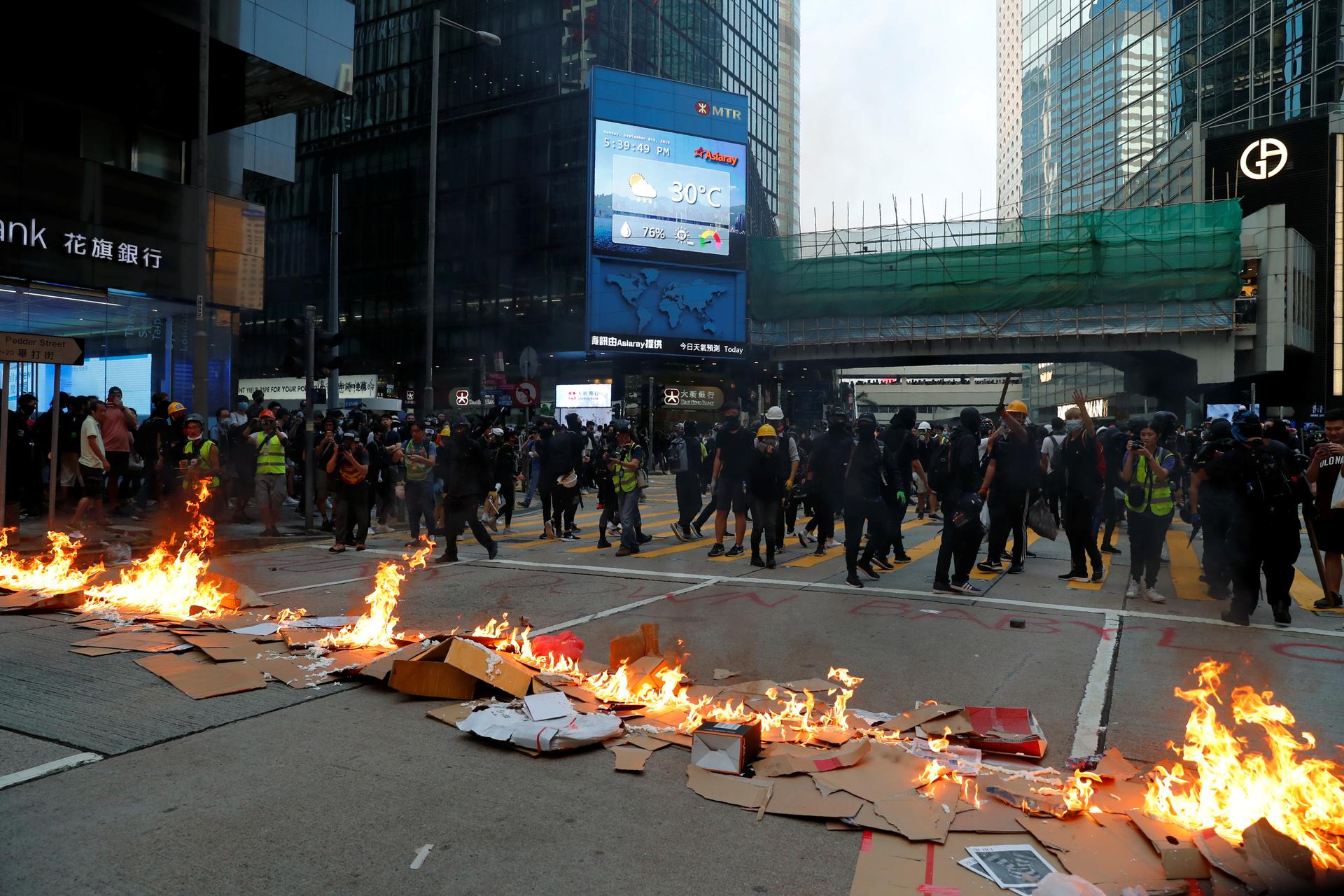
If the protests drag on, the movement will need to maintain the backing of everyday Hongkongers — especially as their street seizures further drag down the city’s economy.
For now, they do seem to enjoy broad support. In late August, they summoned an estimated 1.7 million marchers. That’s roughly 25% of Hong Kong’s population. But each weekend, the protests seem to grow more incendiary and Hong Kong’s police grow more belligerent.
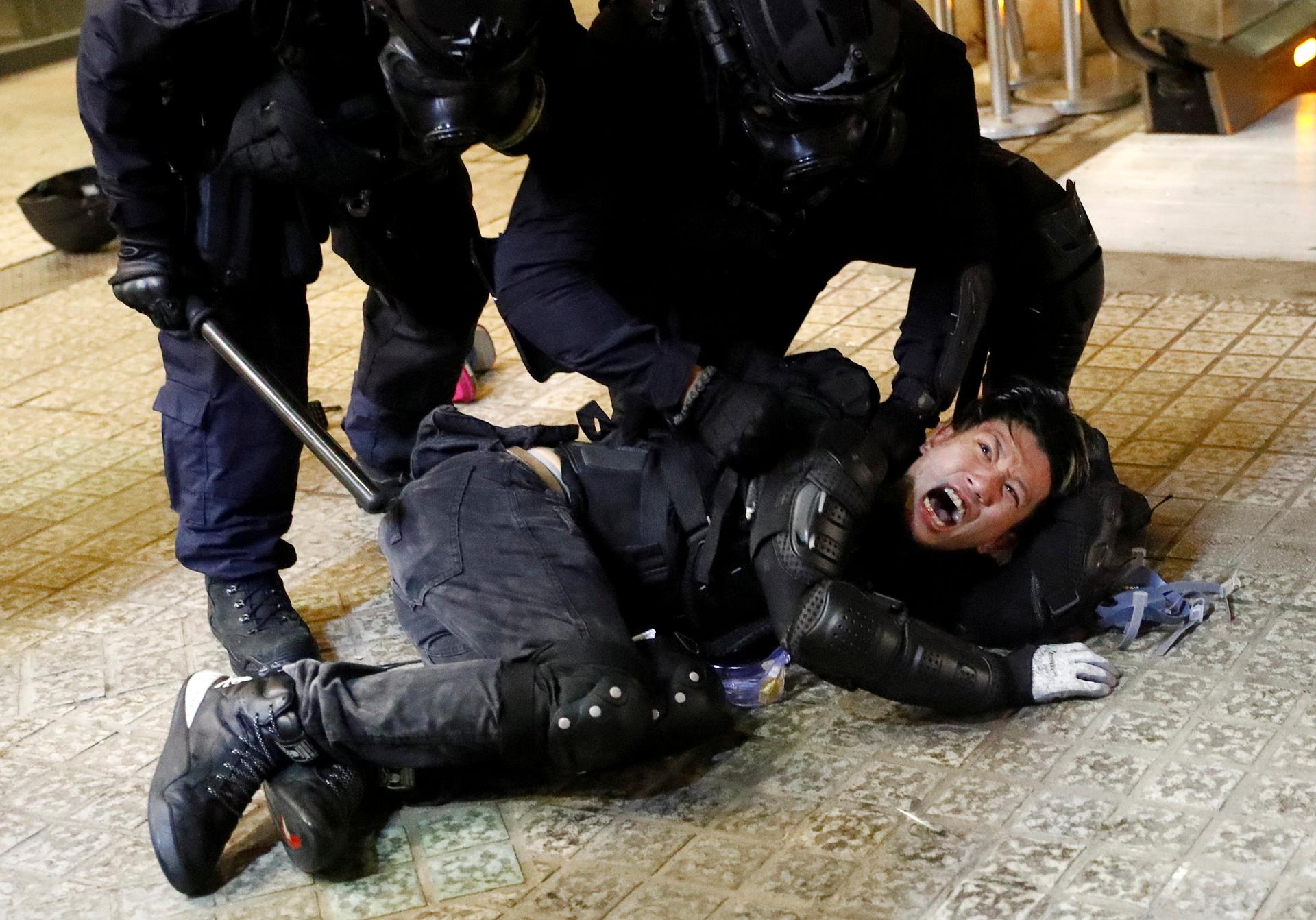
At the moment, this leaderless movement seems to be steered to a large degree by its “front liners,” the more daring protesters who don’t shy from vandalizing public property or going toe-to-toe with riot cops. Their diehard mentality is summed up by this public statement, dictated by a masked-up front liner in a yellow hardhat:
“Every time we go back to the frontline, we make sure to have, in our pockets, our last will and testament. Because every time may be our last.”
“Every time we go back to the frontline, we make sure to have, in our pockets, our last will and testament. Because every time may be our last. We are ready and willing to lay down our lives for our beloved city and our fellow Hongkongers.”
To super-patriots such as Tang, these are the words of a traitor. But that doesn’t mean he finds all of them irredeemable. Asked if he would ever sit down with someone his side deems “radical,” he offered a quick and unconditional yes.
“I actually think most of them have very good intentions to make Hong Kong better. That’s a common thing between me and them. So how do we achieve that goal?” he says. “We have to talk. We don’t have to fight. If someone like that comes here, saying ‘Let’s go to the bar and have a beer,’ then I’d say, ‘Why not?’ That sounds nice.”
